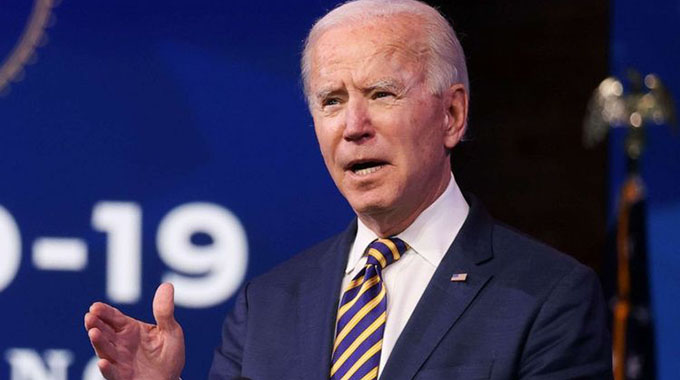Western Sahara: Fate of international legality at stake

Deich Mohamed Saleh
Correspondent
If the new United States administration does not speed up to remedy the damage caused to international norms as a result of the “quid pro quo” policy followed by the previous administration, there will be no international consensus.
Such inclination undermines humanity’s aspirations for progress, security, and stability.
Rather, it will encourage injustice, autocracy, expansion tendency, and state terrorism.
President Joe Biden’s reversal of a number of his predecessor’s decisions, immediately after his inauguration ceremony, inspires optimism about cancelling the illegal recognition of Morocco’s sovereignty over Western Sahara.
Donald Trump’s recognition of the annexation of Western Sahara by the Kingdom of Morocco, on December 10, 2020 was a blow to the UN Charter and resolutions, which still classify the territory as a non-self-governing.
However, this decision is a precedent for bullying and betrayal of the values and principles on which the United Nations was founded and for those of the US. Many Arab countries, including Morocco, hurried to normalise relations with Israel, not in pursuit of peace, but in exchange for providing protection for their repressive and corrupt regimes.
Western Sahara is located on a vast area of the Atlantic coast in northwest Africa, bordered by Morocco to the north, Algeria to the east, and Mauritania to the south and southeast. The territory was known, in the past, by a distinguished rule system in which its membership was based on tribal nomination, and its presidency was deliberated among the members.
Spain had taken over the territory since the Berlin Conference of 1884 until 1976. Western Sahara, or Spanish Sahara as it was called during Spanish rule, has been on the United Nations list of Non-self-governing Territories since 1963 following the transmission of information by Spain under Article 73 (e) of the Charter of the United Nations.
In its first resolution of 1965, the UN General Assembly asked Spain to decolonise the territory.
In 1974, Spain accepted to organise a referendum of self-determination, but it was delayed as Morocco claimed the territory. At the request of the UN General Assembly, the International Court of Justice issued an Advisory Opinion on November 16, 1975, in which the Court dismissed Moroccan claims of the territory.
The ICJ ruled that it “has not found legal ties of such a nature as might affect the application of resolution 1514 (XV) in the decolonisation of Western Sahara and, in particular, of the principle of self-determination through the free and genuine expression of the will of the peoples of the Territory.”
The local resistance to Spanish colonialism did not stop to culminate in the founding, in 1973, of the national liberation movement, the Polisario Front (Frente Popular para la Liberación de Saguía el Hamra y Río de Oro), and the declaration of armed struggle. Three years earlier, the inhabitants demanded an end to Spanish colonialism during demonstrations in June 1970, in which the Spanish forces used fire against demonstrators and detained their leader, whose fate is still unknown to this day.
Once the Spanish colonial appeared weak under Polisario’s pressure, a dirty plot was elaborating between Spain, Morocco and Mauritania to circumvent the ICJ’s decision and occupy the Western Sahara by force. The three countries signed an agreement, on November 14, 1975 in Madrid, by which Spain ceded the territory to Morocco and Mauritania.
Moroccan and Mauritanian forces invaded Western Sahara a few days before Spain had withdrawn from the territory, interrupting the transformation of power to the authorities of the SADR (Saharawi Arab Democratic Republic), which was proclaimed by the Polisario Front on February 27, 1976.
Thus, war broke out between the three countries, causing great suffering to the people of the territory. Mauritania retreated in 1979, following an agreement with the Polisario Front, leading to the recognition of the SADR.
A ceasefire was reached in 1991 to put an end to 16 years of war, after the Polisario Front and the Kingdom of Morocco, under the supervision of the UN and the Organisation of African Unity, now the African Union, had agreed to a self-determination referendum as the best compromise for their conflict.
However, as soon as the United Nations published the provisional list of eligible voters, the Kingdom of Morocco refused to move forward, ignoring nearly 30 years of UN efforts in which the US had played a major role. Distinguished personalities such as James Inhofe, James Baker, John Bolton, Christopher Ross and others, who worked closely to the issue of Western Sahara, strongly warned of bad consequences if international legality is not respected in Western Sahara.
A matter of great importance which cannot be jumped over, is the membership of the SADR in the African Union and the strong support it enjoys within the bloc. Moreover, the Saharawi people are clinging to their country and are ready to die for it.
In this regard, Trump’s disregard for the legal status of Western Sahara and the inalienable right of its people to self-determination and independence unveils the weakness of the UN, losing confidence in any role it could play in resolving conflicts. There has been a backlash against Trump’s bias towards the expansionist ambitions of the Moroccan regime, which tarnished the US’ reputation abroad and squandered its influence in the UN , as a sponsor of the world order.
Rather, it will escalate tensions in the whole region and complicate restoration of peace again.
The Moroccan regime has dedicated to bartering its allegiance to the US and France in exchange for their silence about its violations of international law in Western Sahara and keeping the case frozen. The UN could not impose the referendum; because Morocco rejected it. The Security Council could not include human rights monitoring in the mandate of the United Nations Mission (MINURSO); because that would reveal the truth about the crimes committed by the Moroccan forces against Saharawi Civilians in the occupied territory of Western Sahara.
Many have turned a blind eye to Morocco’s plundering of the natural resources of the Western Sahara, because they benefit from that. Finally, it is Morocco that decides on the Western Sahara, not the UN. Recently, on last November 13, in the buffer zone of Guerguerat in the South of Western Sahara, Moroccan forces breached the ceasefire by attacking Saharawi civilians who were protesting to stop the plundering of their natural resources.
The UN Mission (MINURSO) did nothing, despite its presence on the ground.
This flagrant violation of the provisions of the ceasefire agreement made the Polisario Front and the government of the SADR announce the end of stalemate in the political process would lead to such consequences. Now, war has broken out again and escalation may affect the whole Maghreb and Sahel region.
Patience among the Saharawi people has run out as a result of their disappointment at the United Nations after nearly 30 of waiting for the mirage of a just, free democratic plebiscite to allow them to decide their future. Any attempt to bring the two parties together will be doomed to fail unless it takes into account the Saharawi conditions based on a new agreement.
During its 14th extraordinary summit on Silencing the Guns last December, the AU agreed on outlines for a new approach that would lead to a new agreement between the two member states.
International stakeholders, especially the group of friends of Western Sahara, must collaborate with the AU to put this approach on track.
It is time for the international community to consolidate the values and principles of democracy and justice, giving priority to the implementation of self-determination in Western Sahara as it is the principle on which all the countries of the UN were found. Let history record everyone’s consensus about the longstanding issue of the Western Sahara, the last colony in Africa.
Deich Mohamed Saleh was the Office’s Chief of the late Western Sahara President Mohamed Abelaziz and former Ambassador to Zimbabwe.








Comments